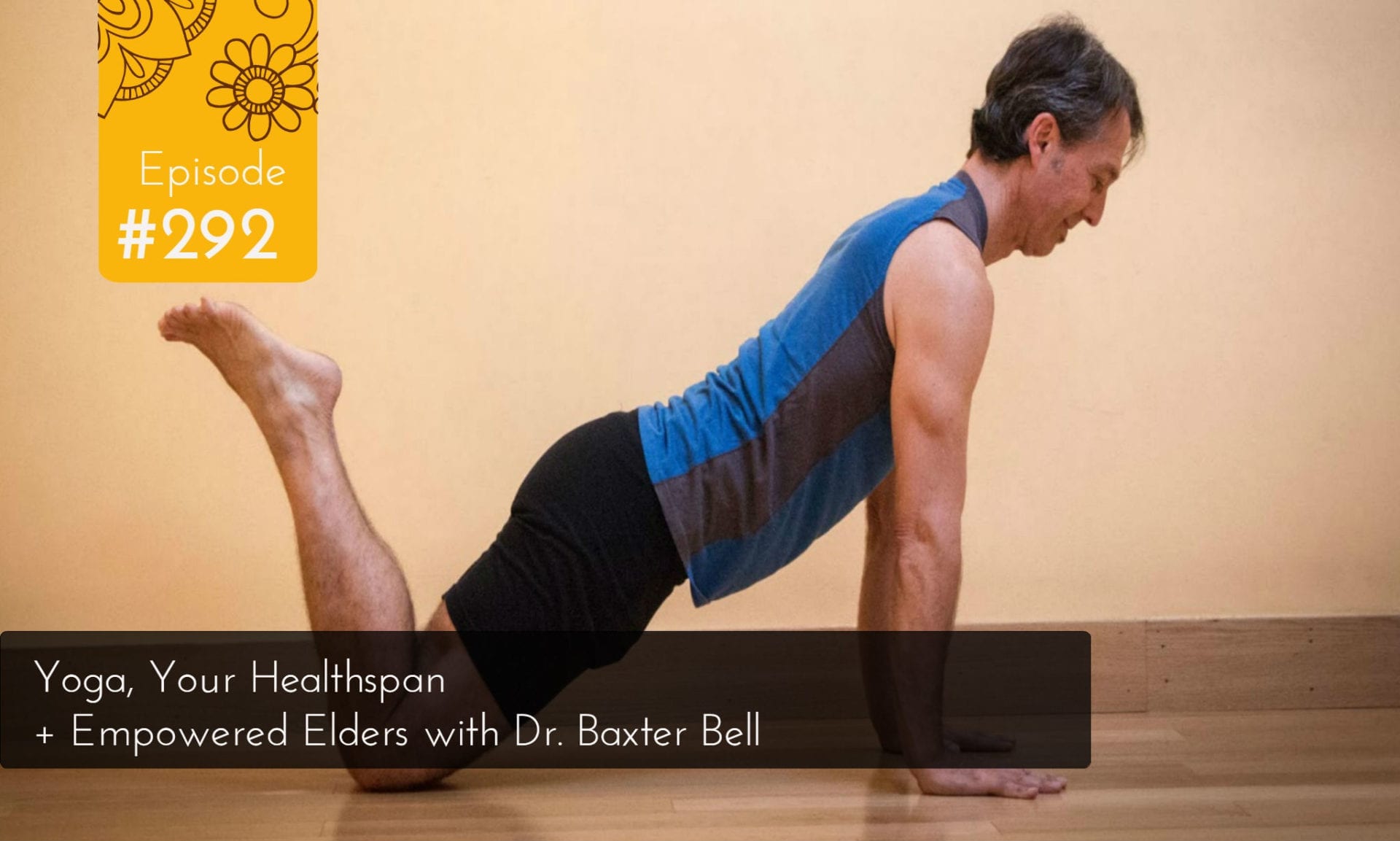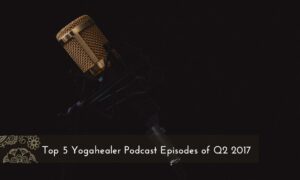Where is western medicine part of the problem with stress and preventable disease
Can anyone actually promise practices that will increase longevity or how long you live? And if not, should we just do whatever we want and not worry about doing yoga or our taking care of our health?
Are there any paradoxes that you have discovered in working on the ideas of Yoga for Healthy Aging? (e.g. that restorative practices can actually assist in weight loss!)
Should yoga students just wait until they start to feel “old” or develop an age-related chronic illness such as high blood pressure before they start to learn these specific techniques?
And what do we do with the reality that we will all age, we will all suffer some period of ill health and eventually die? Does yoga offer us any ways to address this with an even mind and spirit?
I rap with Baxter Bell about healthy aging:
- The six key factors for healthy aging
- The difference between what our society tells us about aging and the lived experience of people practicing Yoga and Ayurveda
- The increasing amount of older people practicing and becoming empowered by yoga
What you’ll get out of tuning in:
- Why you should focus on healthspan instead of lifespan
- How to use yoga for healthy aging
- Why collaboration is much more impactful than competition
Links:
- Baxter Bell’s Facebook
- Baxter Bell’s Website
- Yoga for Healthy Aging Blog
- Pre-order Yoga for Healthy Aging here.
Show Highlights:
- 4:30 – In the medical profession, the main social assumption is that we don’t need to pause and reflect. This causes unaddressed stress for the people who are supposed to be taking care of the rest of us!
- 8:40 – While much of the mainstream media focuses on the next technology or drug, Yoga is permeating into the culture more and more, with more people than ever practicing yoga or interested in trying it in the near future, and with more people from western medicine and science advocating for it as well.
- 18:15 – In our modern society, the cultural norm is that as you age, you start to deteriorate. But that is simply not the experience for many people, which speaks to the importance of increasing healthspan, not lifespan: instead of trying to live as long as we can, let’s try to live as healthfully as we can for the years we have available.
- 21:50 – Some of the key themes for healthy aging include building strength, flexibility, balance, and agility, developing cardiovascular health and brain health, maintaining independence, and practicing equanimity.
- 28:00 – Growing and expanding and creating with other people improves reach and impact much more than retreating into a competitive mindset.
- 33:50 – In many societies outside the western culture, there is much more respect for older people, which is reflected in the way older people live healthfully and easefully until late in life.
Favorite Quotes:
- “It was one of the few times that my mind slowed down, stopped, reflected, and felt, as opposed to being on that treadmill of what’s next.” – Dr. Baxter Bell
- “Especially for males in a modern context, there’s really no social acceptance of reflection.” – Cate Stillman
- “Increasing healthspan, not lifespan… I want to be as healthy as I can for the years I have available.” – Dr. Baxter Bell
- “That’s not what we’re being told by mainstream media. We’re being told to expect problems, to get help, to be on medications, to expect that we’ll need help with everyday activities.” – Dr. Baxter Bell
- “Know what you want out of it and aim for that. Then this whole other world is going to open, and you’ll want different things in a few months or in a few years.” – Cate Stillman
- “When people start to practice new ways of moving, and breathing, and relating to themselves, their integrity increases.” – Cate Stillman
- “Maybe we’re just okay, but we want to be healthier than we are right now.” – Dr. Baxter Bell
- “How much is our expiration date a mindset?” – Cate Stillman
BIO:
Baxter Bell, MD, C-IAYT, eRYT500
Cofounder of the Yoga for Healthy Aging blog and co-author with Nina Zolotow of the upcoming book “Yoga for Healthy Aging”, Baxter is a medical doctor and medical acupuncturist, as well as a certified yoga teacher and yoga therapist. Baxter practiced as a family physician from 1989 to 2000. Then, in 2001, he completed the 18-month, 680-hour Advanced Studies Program at Piedmont Yoga Studio in Oakland, California, with Richard Rosen, Rodney Yee, Mary Paffard, and Patricia Sullivan. In 2000, he completed his 300-hour medical acupuncture training. In 2017, he was certified as a yoga therapist by the International Association of Yoga Therapists.
Based in Oakland, California, Baxter was director of the Deep Yoga Teacher Training at Piedmont Yoga Studio for seven years and is currently serving as an adjunct faculty member on teacher training programs and therapeutic yoga trainings around the country. He teaches locally in the San Francisco Bay Area, offering regular yoga classes to the general public as well as specialty classes for those with back pain and adults with disabilities, and teaches workshops and retreats worldwide with an emphasis on yoga for healthy aging and how yoga can be used therapeutically to improve health and well-being. He also combines his experience as a family physician with his training in medical acupuncture in his complementary medical practice in Oakland, where he focuses on acupuncture and therapeutic yoga. He is featured in the Yoga Journal: Yoga for Stress DVD as well as on the Practice Channel at YogaUOnline. To find out more about Baxter or to contact him, visit his website, and view his instructional videos (including for many of the poses in his upcoming book) visit his YouTube channel “Baxter Bell Yoga.”


